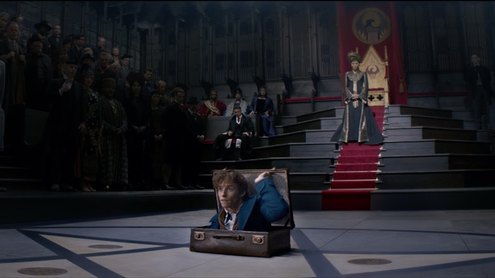B- | A magic zoologist intersects with an evil plot in 1920's New York Directed by David Yates Starring Eddie Redmayne, Katherine Waterston, and Dan Fogler Initial Review by Jon Kissel |

Rowling, like any creator of fantasy, has to be good at building out a universe with its own rules. I never questioned the wizard war in Harry Potter, because it seemed to exist only within its own magical bubble. In creating a wider universe for Fantastic Beasts, Rowling creates more questions than she answers. The specter of real historical events existing alongside rewind spells is quease-inducing. Sidekick and audience surrogate Jacob Kowalski (Dan Fogler) has spent the last several years in the army, a chunk of which found him fighting in WWI. What, pray tell, were the wizards doing during this period of mass death? Did they have a cure for the Spanish Flu, by any means? By mentioning in a single line that the no-maj (ugh) world is essentially the same as the real one, Rowling turns every wizard into the bad guys in the Good Samaritan parable.
If the script and the world-building are mostly failures, how about the look of a film that cost around $200 million? Yates’ direction is forgettable, and the effects are often bad. I was surprised to most appreciate Fogler’s performance as Kowalski. Despite a complete lack of disbelief at having his entire world upended, and a preference for the word ‘youse,’ he had several strong moments and a mildly affecting goodbye, though his presence in the sequel makes it meaningless. I give all the credit to Fogler, because the film, and Yates, is completely letting his down. His stakes are retaining the memory of what should be the wondrous new world of the inside of Newt’s suitcase, and it should be the easiest thing for a filmmaker with bottomless wells of cash to create the same wonder in the viewer. Yates utterly fails to include memorable creatures who qualify as magical. Instead, he crosses a lion and a porcupine and includes it in a fake tracking shot filled with obtrusive 3d effects. In the film’s triumphant ending, being drugged by a magic roofie is no great loss for Kowalski or millions of other New Yorkers. How will they go on without knowing about the existence of a shrew who likes gold?
Fantastic Beasts and Where to Find Them is pointless and mercenary. For a final example of its laziness and inability to consider the world it’s building, Newt points out the last mating couple of some species or other. As a zoologist, Newt would surely know that this means the species is doomed, as the lucky couple can look forward to banging their children and experiencing the joy of a drained gene pool and its many stillbirths before fading into extinction. Instead, Fantastic Beasts thinks this is some kind of renewal. That’s actually a pretty solid metaphor for the Wizarding World universe, in that more material is generated but the larger property gets weaker and weaker. D+
 RSS Feed
RSS Feed